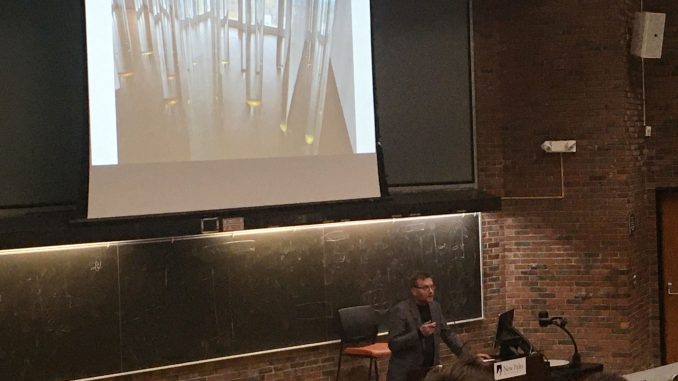
Have we reached the end of the world?
In the summer of 2019, a series of headlines flooded the internet claiming that we could face a climate-caused doomsday by the year 2050.
With global warming and total climate collapse becoming an ever-looming and ever-worsening threat, many fear that the apocalypse is now, and we as a society are obsessed with it. At least that’s what Pennsylvania State University philosophy professor Ted Toadvine presented on Monday, Feb. 10 from 5-7 p.m. during his lecture “Why are We Obsessed with the End of the World?”
Are we actually obsessed with Armageddon? Well, think about it.
Toadvine argues that our obsession is evident in the books we read and movies/TV shows we watch. Young adult reading lists are plastered with dystopian bestsellers like the “Hunger Games” trilogy or the “Divergent” series. At its peak, “The Walking Dead” amassed over 17 million viewers, and films such as “Apocalypse Now” are no strangers to the Academy Awards.
But beyond our apocalyptically themed entertainment, this fear of the world’s end holds real ground in current geological events.
In the past, when storytellers imagined our destruction, mankind was wiped out by natural phenomenons such as earthquakes or plagues. But over the course of the last few decades, human-caused climate catastrophe has become “our favorite vision of the end,” according to Toadvine. Even spurring on a new genre of fiction: cli-fi, or climate fiction; think “Interstellar.”
But why this sudden trend towards a climate-based apocalypse?
Toadvine stated that “it is commonplace to hear climate change identified as the single most important challenge facing humanity.” He pointed out that the United Nations’ website states that “climate change is the defining issue of our time, and we are at a defining moment.”
It truly seems to be our final prediction of doomsday… for now.
In the time of the Cold War, total nuclear destruction was our leading fear. At the beginning of the millennium, the Y2K bug caused mass apocalypse panic. But both times, the world didn’t end, and we can’t actually say it’s ending now.
Even stating that climate change is our most pressing issue is off-putting. Toadvine stated that this makes him uneasy because it pushes other world problems — racism, poverty, etc. — to the side and undermines them.
“With those whose lives, livelihoods and communities have been destroyed by extractive industries, by settler colonialism, by forced migration, by police violence, by the intersections of violence and oppression, whether they agree that climate change is the defining issue of our time, or that every available resource should be mobilized to maintain the world in its present form, [is] far from obvious to me,” Toadvine explained.
The double-edged sword is that the most vulnerable, “the poor, women, children, the elderly, communities of color, the displaced, the incarcerated,” Toadvine listed, are those who would suffer the most in the face of climate collapse.
Perhaps the reason the world is so ready to put this problem on the highest pedestal is that climate-based annihilation would affect everyone, even the most privileged. And there is undeniable proof that it is a very real threat.
According to Toadvine, studies have shown that we have already caused an irrevocably altered climate for at least the next millennium. And the list of consequences are catastrophic: rising sea levels, widespread famines, plagues, mass migration, unnatural weather changes; the list goes on and on.
But it’s not time to theorize and mourn our Earth’s destruction. It’s time to demand that action be taken.
Independent efforts against climate change — reducing your carbon footprint, installing solar panels, etc. — are very important, but unfortunately, not enough to resolve the issue alone.
“Climate change is like an ocean and every individual is putting an eyedropper in it,” Toadvine said. “Because the numbers are so huge, it can’t be solved by individuals.”
He compared the required solution for climate change to that of the issue of burning lead gasoline. Once the environmental effects were discovered, it wasn’t up to each individual driver to solve the problem, if they chose to, by installing a catalytic converter to their car. That wouldn’t be much help. Instead leaded gas became against the law (with some exceptions) and after a certain year, every car needed to have a catalytic converter.
“We had an institutional solution because it’s a collective problem,” Toadvine explained.
At the 2019 Climate Action Summit, UN Secretary-General António Guterres had a similar viewpoint, stating, “we need more concrete plans, more ambition from more countries and more businesses. We need all financial institutions, public and private, to choose, once and for all, the green economy.”
It’s time to focus on a collective solution to climate change. Because, after all, it doesn’t have to be the end of the world.
